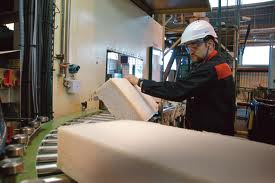 Japan's International Co-operation Agency (JICA) will help Viet Nam to improve the country's rubber industry, which will help reduce the nation's greenhouse emissions.
Japan's International Co-operation Agency (JICA) will help Viet Nam to improve the country's rubber industry, which will help reduce the nation's greenhouse emissions. The US$3.9 million project was signed by representatives from the Vietnamese Government and JICA.
The five-year project aims to help Viet Nam create a plan to replace synthetic rubber, which is made from fossil fuels, with natural rubber.
Japan's International Co-operation Agency (JICA) will help Viet Nam to improve the country's rubber industry, which will help reduce the nation's greenhouse emissions.
The US$3.9 million project was signed yesterday by representatives from the Vietnamese Government and JICA.
The five-year project aims to help Viet Nam create a plan to replace synthetic rubber, which is made from fossil fuels, with natural rubber.
"Under this project, we (the Vietnamese and Japanese experts) will work together to develop methods to create natural rubber as well as methods to purify the material and develop highly functional polymers," said President of Ha Noi University of Science and Technology Nguyen Trong Giang.
"Moreover, we also plan to develop advanced technology that will treat wastewater created during the production of the commodity," said Giang.
The project will be managed by five research groups, who work at Nagaoka University of Technology of Japan, Ha Noi University of Science and Technology and Rubber Research Institute of Viet Nam.
"Rubber and the use of rubber products are popular in Viet Nam, where rubber production has been exponentially growing in recent years," said JICA Chief Representative in Viet Nam Tsuno Motonori.
"Products that are made from natural rubber are known as ‘green material', which is environmentally friendly," said Motonori.
The Ministry of Agriculture and Rural Development will also co-ordinate with JICA to implement a four-year project that will improve agricultural production and the quality of produce in Viet Nam.
The $3.46 million project aims to protect and cultivate safe plants and crop varieties that meet standards that are congruent with the international treaties that Viet Nam has signed.
The project will also teach workers how to produce ‘safe plants and crops' in Quang Ninh, Hung Yen, Ha Nam, Thai Binh and Hoa Binh provinces.
The five-year project aims to help Viet Nam create a plan to replace synthetic rubber, which is made from fossil fuels, with natural rubber.
"Under this project, we (the Vietnamese and Japanese experts) will work together to develop methods to create natural rubber as well as methods to purify the material and develop highly functional polymers," said President of Ha Noi University of Science and Technology Nguyen Trong Giang.
"Moreover, we also plan to develop advanced technology that will treat wastewater created during the production of the commodity," said Giang.
The project will be managed by five research groups, who work at Nagaoka University of Technology of Japan, Ha Noi University of Science and Technology and Rubber Research Institute of Viet Nam.
"Rubber and the use of rubber products are popular in Viet Nam, where rubber production has been exponentially growing in recent years," said JICA Chief Representative in Viet Nam Tsuno Motonori.
"Products that are made from natural rubber are known as ‘green material', which is environmentally friendly," said Motonori.
The Ministry of Agriculture and Rural Development will also co-ordinate with JICA to implement a four-year project that will improve agricultural production and the quality of produce in Viet Nam.
The $3.46 million project aims to protect and cultivate safe plants and crop varieties that meet standards that are congruent with the international treaties that Viet Nam has signed.
The project will also teach workers how to produce ‘safe plants and crops' in Quang Ninh, Hung Yen, Ha Nam, Thai Binh and Hoa Binh provinces.
Source:
Source: VNS, Agroviet

 Previous page
Previous page Back to top
Back to top







